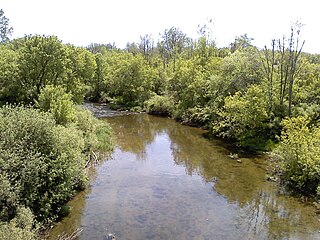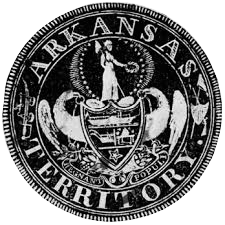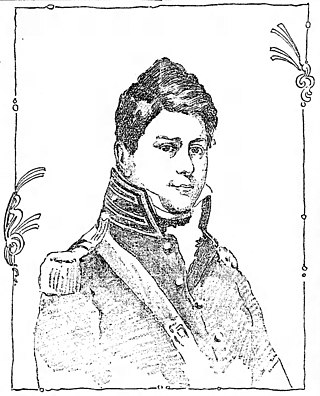Related Research Articles

The Territory of Michigan was an organized incorporated territory of the United States that existed from June 30, 1805, until January 26, 1837, when the final extent of the territory was admitted to the Union as the State of Michigan. Detroit was the territorial capital.

The Clinton River is a river in southeastern Michigan in the United States. It is named in honor of DeWitt Clinton, who was governor of New York from 1817 to 1823.

The 1848 Wisconsin gubernatorial election was held on May 8, 1848. This was the election for the first Governor of Wisconsin, which became a U.S. state that year, as it was held concurrent with a public referendum to ratify the Constitution of Wisconsin.

The Sixth Michigan Territorial Council was a meeting of the legislative body governing Michigan Territory, known formally as the Legislative Council of the Territory of Michigan. The council met in Detroit in two regular sessions, one extra session, and one special session between January 7, 1834, and August 25, 1835, during the terms of George B. Porter and Stevens T. Mason as territorial governors.

The General Assembly of the Territory of Arkansas, commonly known as the General Assembly, was the legislature of the U.S. territory of Arkansas, from 1819 to 1835. The General Assembly was directly elected, albeit on a restricted franchise. Its legislative power was subject to veto by the appointed Governor.
The Michigan Territorial Council, known formally as the Legislative Council of the Territory of Michigan, was the legislative body of the Territory of Michigan from 1824 to 1835, when it was succeeded by the Michigan Legislature in anticipation of Michigan becoming a U.S. state. A session of the council including only members from what would become Wisconsin Territory met in 1836.

The Fifth Michigan Territorial Council was a meeting of the legislative body governing Michigan Territory, known formally as the Legislative Council of the Territory of Michigan. The council met in Detroit in two regular sessions between May 1, 1832, and April 23, 1833, during the term of George B. Porter as territorial governor.
The Fourth Michigan Territorial Council was a meeting of the legislative body governing Michigan Territory, known formally as the Legislative Council of the Territory of Michigan. The council met in Detroit in two regular sessions between May 11, 1830, and March 4, 1831, during the terms of Lewis Cass and George B. Porter as territorial governor.
The Third Michigan Territorial Council was a meeting of the legislative body governing Michigan Territory, known formally as the Legislative Council of the Territory of Michigan. The council met in Detroit in two regular sessions between May 5, 1828, and November 5, 1829, during the term of Lewis Cass as territorial governor.
The Second Michigan Territorial Council was a meeting of the legislative body governing Michigan Territory, known formally as the Legislative Council of the Territory of Michigan. The council met in Detroit in two regular sessions between November 2, 1826, and April 13, 1827, during the term of Lewis Cass as territorial governor.
The First Michigan Territorial Council was a meeting of the legislative body governing Michigan Territory, known formally as the Legislative Council of the Territory of Michigan. The council met in Detroit in two regular sessions between June 7, 1824, and April 21, 1825, during the term of Lewis Cass as territorial governor.

Abraham Edwards was an American physician and politician in the U.S. state of Michigan. He served in the U.S. Army during the War of 1812 and was president of the Michigan Territorial Council for a majority of its existence.

George F. Lewis was a nineteenth-century American journalist and proprietor of several newspapers. He helped in the printing of the first time news of presidential election results were published. He was involved in determining there was copper ore in Michigan to be mined. He was also mayor of Saginaw, Michigan.
William Henry Puthuff, also spelled Puthoff, was an American soldier, businessman, and politician who served in the War of 1812 and occupied a number of government positions in the Territory of Michigan. In his role as Indian agent at Michilimackinac, he engaged in a multi-year conflict with John Jacob Astor and his American Fur Company. He was a member of the First Michigan Territorial Council and died while attending its first session.

Hubert Lacroix or Le Croix was an American soldier, trader, and politician who fought in the War of 1812. He was captured by the British following the surrender of Detroit and saved from charges of treason by his friend, the Shawnee chief Tecumseh. Lacroix later served two terms as a member of the Michigan Territorial Council.
Wolcott Lawrence was an American jurist, businessman, and politician who served multiple terms on the Michigan Territorial Council.
Roger Sprague was an American businessman and politician in New York and the Territory of Michigan. He served in the New York State Assembly and on the Michigan Territorial Council.
The 1823 Michigan Territorial Council election was held in the Territory of Michigan to elect the members of the territory's newly-formed legislative council.
The 1825 Michigan Territorial Council election was held in the Territory of Michigan to elect the members of the territory's legislative council.
References
- Carter, Clarence E., ed. (1943), The Territorial Papers of the United States, vol. 11, Washington, D.C.: Government Printing Office, retrieved 2019-10-14
- Journal of the Legislative Council of the Territory of Michigan: Second Session—First Council, Detroit: Sheldon and Reed, 1825, retrieved 2019-10-14
- Leeson, M. A. (1882), History of Macomb County, Michigan, Chicago: M. A. Leeson, retrieved 2019-10-14